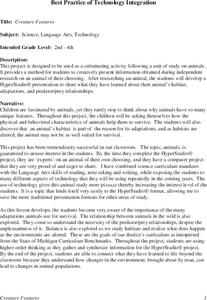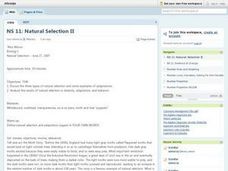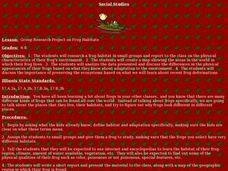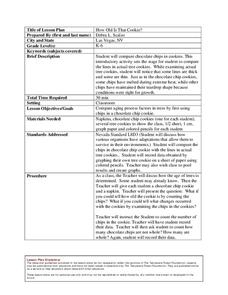Curated OER
Penguins Marching in Your Classroom
Sixth graders examine how penguins adapt to their Antarctic environment. Once they locate Antarctica on a map, they describe its characteristics and differences from other continents. After describing how penguins differ from more...
Curated OER
Scales, Scutes, and Skins
Students identify the various adaptations of reptiles and amphibians. After distinguishing between reptiles and amphibians, students discuss the ways in which their adaptations aid in their survival. They participate in a hands on...
Curated OER
Natural Selection Foldable
Learners examine and identify examples of species that developed as a result of immigration, genetic drift, and adaptive radiation. They conduct Internet research and define key vocabulary terms, and use their species example on their...
Alabama Learning Exchange
I Will Survive
Young scholars explore animal adaptations. In this animal science lesson, students watch the video "Kratt's Kreatures" and work in groups to complete a worksheet about animal adaptations.
Curated OER
Snug in the Snow
Students explore how snow helps animals survive in the wild. In this animal science lesson, students review key vocabulary words and discuss types of animal adaptations. Students construct shoebox to simulate the snowy environment where...
Curated OER
Candy Dish Selection
Students explore natural selection. They explore the concepts of adaptations, and the way which random factors affect the survival of individuals and populations.
Curated OER
Hide and Seek
Students examine animals that use camouflage and discuss why they use it. They create drawing of an imaginary animal that uses camouflage to hide in the classroom and identify the adaptations that would allow it to hide effectively.
Curated OER
Creature Features
Students investigate animals and how they adapt to their environment. They design a multimedia presentation that includes information about an animal of their choice. They include a title card, habitats, adaptations, and a predator/ prey...
Curated OER
A Tail to Tell
Young scholars observe populations of Lumbriculus to discover some of the adaptations that allow them to live successfully along the shores of ponds and marshes. They also design and perform experiments to test proposed hypotheses for...
Curated OER
Earthworm Bridge
Fourth graders complete analysis experiments for decomposers and their adaptable traits. In this decomposers lesson, 4th graders test worm behavior to light, sound, warmth, touch, and moisture. Students work in groups to analyze the...
Curated OER
Natural Selection II
Students participate in a discussion about the three types of natural selection. In groups, they identify examples of adaptations from photographs. To end the lesson, they analyze results of natural selection in adaptation, behaviors...
Curated OER
Climate Types
In this weather worksheet, middle schoolers identify the type of vegetation found in particular regions across the United States. Then they list the six groups of climates in the Köppen Classification System. Students also describe the...
Curated OER
Diversity of Life
In this biodiversity worksheet, students look at 3 illustrations and identify an adaptation for survival for each organism. Then students review the concept of biodiversity. This worksheet has 5 short answer questions.
Curated OER
Unique Plants of the Biomes
Students examine how the earth is divided into different biomes that are characterized by a distinctive climate. In this earth's surface lesson students identify adaptations of plants in specific biomes.
Curated OER
Hibernation and Estimation
In this hibernation worksheet, students first read the passage below about animals who hibernate to adapt to the cold weather. They then answer the 10 questions at the bottom of the page.
Curated OER
Into the Sea
Students display an awareness of the diversity of species in the coral reef, their habitat and adaptations. They conduct research to find and then color code the locations of coral reefs around the world.
Curated OER
Group Research Project on Frog Habitats
Learners identify and research a frog habitat in small groups and compile a report to present to the class on the physical characteristics of their frog's environment. Students create a map illustrating areas in the world where their...
Curated OER
A Long Winter's Nap
Learners explore the process of estivation, hibernation and torpor and the ways that frogs adapt to seasonal weather changes.
Curated OER
Waddle You Know About Penguins
Second graders study the similarities and differences of the seventeen species of penguins. They investigate habitats and how these habitats are suited to each species characteristics. They see how animals adapt to their environments.
Curated OER
Totally Termites
Learners explore the world of termites, their adaptations, and anatomy. They examine the property risks of termites and how pest control professionals manage termite problems.
Curated OER
Characteristics of Plants
In this characteristics of plants worksheet, students conduct an experiment on how a vascular plant moves nutrients to all its parts. They describe the difference between the celery leaf from sugar water and plain water. Students also...
Curated OER
Characteristics of Plants
In this characteristics of plants worksheet, students name two things that all plants have in common. Then they describe how the cell walls and cuticles help plants adapt to life on land. Students also explain the difference between...
Curated OER
How Old is that Cookie?
Students investigate adaptation. In this cookie age lesson plan, students examine changes and variations in chocolate chips in cookies in preparation for determining the age of trees using lines. Students discuss how the age...
Curated OER
Biomes: Freshwater & Seawater
Students observe organisms behavior and adaptations. In this biomes lesson students conduct fieldwork to determine water quality and answer questions about the differences between different habitats.
Other popular searches
- Animal Adaptations
- Ocean Animal Adaptations
- Bird Beak Adaptation
- Plant Adaptations
- Behavioral Adaptations
- Adaptation and Evolution
- Bird Adaptations
- Insect Adaptations
- Plant and Animal Adaptation
- Fantasy Animal Adaptations
- Fish Adaptations
- Adaptation Habitat























